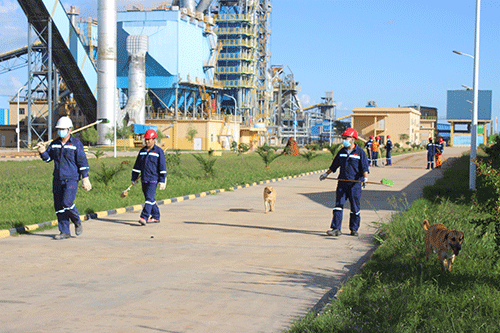The management of Cheetah Cement have called demands by the Mineworkers Union of Namibia unrealistic, and labelled threats of industrial action by the 200-strong workforce as counter-productive.
The MUN on Friday informed Cheetah Cement, owned by Whale Rock Cement (WRC), of a strike scheduled to start tomorrow, 19 July 2022, at 07h30.
According to a letter from MUN’s Northern Regional Organiser Brian Tjihero to Cheetah Cement, the strike will be in compliance with agreed striking rules. Employees will also gather at the demarcated picketing area at the entrance to the cement factory.
The cement company and the MUN have been in protracted wage negotiations since October 2020 at its Otjiwarongo plant. However, thus far, these negotiations have failed to yield positive results. This led to a Certificate of Unresolved Dispute being issued by the Office of the Labour Commissioner. On 8 February 2022, the majority of the employees thus voted in favour of industrial action.
According to WRC, their offer to workers, which the company said will be backdated to January 2021, includes an 80% company contribution towards employees’ medical aid, minimum N$500 housing allowance across the board, N$800 salary increase for all employees earning less than N$6 000 per month, and a N$500 salary increase for those earning more than N$6 000 per month. The company is also willing to provide a meal allowance of N$30 per every working day as well as a shift allowance as per exemption certified conditions currently at 10% of basic salary, going up to 15% in the next two years as an added benefit.
WRC currently pays an 8% night shift allowance, which the company pointed out is 2% more than stipulated in the Labour Act 11 of 2007.
“WRC also puts it on record that during the entire Covid-19 pandemic and the lockdowns that affected the company’s operations, no amount of money was deducted from the employees for not being at work. As a measure to ensure that employees had enough money to survive, WRC utilised leave days, going as far as to pay employees their full remuneration even if they did not have enough leave days to cover the lockdown period,” read a statement from WRC general manager, Kevin Lee.
Lee added that WRC also paid employees half salary bonuses at the end of 2020 and full salary bonuses at the end of 2021, although the company did not make any profit during this time.
Meanwhile, the WRC statement shows that Cheetah Cement employees are demanding a 9% salary increase across the board; 15% pension contribution across the board; 100% medical aid cover (including cover for two dependents); an increase of a N$2 500 housing allowance across the board; salary adjustment to market-related salaries, and for these increases to be backdated to April 2020.
“WRC is disturbed by the position taken by MUN and the workers’ representatives, in particular taking note of the fact that Cheetah Cement has not operated for six consecutive months in each year that it has been in existence. Despite being affected by the pandemic and nationwide lockdown, WRC was also affected by the unstable economy since 2016, which had negatively affected the Namibian construction industry, and led to a reduced demand for cement. Moreover, all the increases and benefits offered to employees by WRC translate to an average increase of at least 45% cost-to-company, an increase that is unheard of in the prevailing Namibian economy,” Lee stated.
He said the WRC is committed to retaining all its current employees, and improving on work conditions as revenue improves.
“However, these unrealistic demands and the threats for industrial action are counter-productive and could result in unwanted job losses,” he added.
- ebrandt@nepc.com.na


